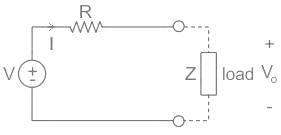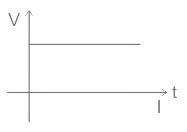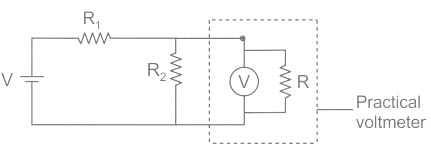Electrical Engineering (EE) Exam > Electrical Engineering (EE) Questions > An ideal voltage source and an ideal voltmete...
Start Learning for Free
An ideal voltage source and an ideal voltmeter have internal impedances respectively:
- a)zero, zero
- b)zero, infinite
- c)infinite, zero
- d)infinite, infinite
Correct answer is option 'B'. Can you explain this answer?
Most Upvoted Answer
An ideal voltage source and an ideal voltmeter have internal impedance...
The General structure of a practical voltage source is shown below:


Writing the KVL, we get:
-V + IR + IZ = 0
V = IR + IZ
V0 = I × Z
V0 = V – IR
The output is depending on the internal resistance (R) of source.
For ideal voltage R = 0
V0 = V – I(0)
V0 = V
∴ The output is independent of the internal resistance as shown:
-V + IR + IZ = 0
V = IR + IZ
V0 = I × Z
V0 = V – IR
The output is depending on the internal resistance (R) of source.
For ideal voltage R = 0
V0 = V – I(0)
V0 = V
∴ The output is independent of the internal resistance as shown:

Voltmeter:
It is an instrument used for measuring the electric potential difference between two points in an electric circuit.
The structure of the voltmeter is shown as:
It is an instrument used for measuring the electric potential difference between two points in an electric circuit.
The structure of the voltmeter is shown as:

To get the correct reading of the meter the internal resistance should not get any current i.e., ideally i = 0, R = ∞
If this is not the case, then the voltage across internal resistance will be displayed in the meter.
If this is not the case, then the voltage across internal resistance will be displayed in the meter.
Conclusion:
- Ideal voltage source internal resistance Rs = 0
- Ideal voltmeter internal resistance Rm = ∞
Free Test
FREE
| Start Free Test |
Community Answer
An ideal voltage source and an ideal voltmeter have internal impedance...
An ideal voltage source and an ideal voltmeter have internal impedances respectively:
The correct answer is option 'B': zero, infinite.
Explanation:
Ideal Voltage Source:
An ideal voltage source is a theoretical concept used in electrical circuit analysis. It is a source that maintains a constant voltage across its terminals regardless of the load connected to it. In other words, it can provide a fixed voltage with zero internal resistance.
- An ideal voltage source is represented by a symbol with a positive and negative terminal and an arrow pointing towards the positive terminal, indicating the direction of the voltage.
- It is often denoted as a perfect voltage source or an ideal battery.
Ideal Voltmeter:
An ideal voltmeter is also a theoretical concept used in electrical measurements. It is a device that measures the potential difference (voltage) across two points in a circuit.
- An ideal voltmeter has an infinite internal impedance or resistance, which means it draws zero current from the circuit being measured.
- It is designed to have no effect on the circuit it is connected to, ensuring accurate voltage measurements.
Impedance:
Impedance is the total opposition offered by a circuit element to the flow of alternating current. It is a complex quantity consisting of both resistance and reactance. The reactance can be inductive or capacitive, depending on the element.
- When the internal impedance of a voltage source is zero, it means that it has no resistance or reactance, resulting in a perfectly ideal source.
- When the internal impedance of a voltmeter is infinite, it means that it draws no current from the circuit being measured, ensuring accurate voltage measurements without affecting the circuit.
Conclusion:
In summary, an ideal voltage source has zero internal impedance, meaning it provides a constant voltage with no resistance or reactance. On the other hand, an ideal voltmeter has infinite internal impedance, ensuring accurate voltage measurements without drawing any current from the circuit.
The correct answer is option 'B': zero, infinite.
Explanation:
Ideal Voltage Source:
An ideal voltage source is a theoretical concept used in electrical circuit analysis. It is a source that maintains a constant voltage across its terminals regardless of the load connected to it. In other words, it can provide a fixed voltage with zero internal resistance.
- An ideal voltage source is represented by a symbol with a positive and negative terminal and an arrow pointing towards the positive terminal, indicating the direction of the voltage.
- It is often denoted as a perfect voltage source or an ideal battery.
Ideal Voltmeter:
An ideal voltmeter is also a theoretical concept used in electrical measurements. It is a device that measures the potential difference (voltage) across two points in a circuit.
- An ideal voltmeter has an infinite internal impedance or resistance, which means it draws zero current from the circuit being measured.
- It is designed to have no effect on the circuit it is connected to, ensuring accurate voltage measurements.
Impedance:
Impedance is the total opposition offered by a circuit element to the flow of alternating current. It is a complex quantity consisting of both resistance and reactance. The reactance can be inductive or capacitive, depending on the element.
- When the internal impedance of a voltage source is zero, it means that it has no resistance or reactance, resulting in a perfectly ideal source.
- When the internal impedance of a voltmeter is infinite, it means that it draws no current from the circuit being measured, ensuring accurate voltage measurements without affecting the circuit.
Conclusion:
In summary, an ideal voltage source has zero internal impedance, meaning it provides a constant voltage with no resistance or reactance. On the other hand, an ideal voltmeter has infinite internal impedance, ensuring accurate voltage measurements without drawing any current from the circuit.

|
Explore Courses for Electrical Engineering (EE) exam
|

|
Similar Electrical Engineering (EE) Doubts
Question Description
An ideal voltage source and an ideal voltmeter have internal impedances respectively:a)zero, zerob)zero, infinitec)infinite, zerod)infinite, infiniteCorrect answer is option 'B'. Can you explain this answer? for Electrical Engineering (EE) 2025 is part of Electrical Engineering (EE) preparation. The Question and answers have been prepared according to the Electrical Engineering (EE) exam syllabus. Information about An ideal voltage source and an ideal voltmeter have internal impedances respectively:a)zero, zerob)zero, infinitec)infinite, zerod)infinite, infiniteCorrect answer is option 'B'. Can you explain this answer? covers all topics & solutions for Electrical Engineering (EE) 2025 Exam. Find important definitions, questions, meanings, examples, exercises and tests below for An ideal voltage source and an ideal voltmeter have internal impedances respectively:a)zero, zerob)zero, infinitec)infinite, zerod)infinite, infiniteCorrect answer is option 'B'. Can you explain this answer?.
An ideal voltage source and an ideal voltmeter have internal impedances respectively:a)zero, zerob)zero, infinitec)infinite, zerod)infinite, infiniteCorrect answer is option 'B'. Can you explain this answer? for Electrical Engineering (EE) 2025 is part of Electrical Engineering (EE) preparation. The Question and answers have been prepared according to the Electrical Engineering (EE) exam syllabus. Information about An ideal voltage source and an ideal voltmeter have internal impedances respectively:a)zero, zerob)zero, infinitec)infinite, zerod)infinite, infiniteCorrect answer is option 'B'. Can you explain this answer? covers all topics & solutions for Electrical Engineering (EE) 2025 Exam. Find important definitions, questions, meanings, examples, exercises and tests below for An ideal voltage source and an ideal voltmeter have internal impedances respectively:a)zero, zerob)zero, infinitec)infinite, zerod)infinite, infiniteCorrect answer is option 'B'. Can you explain this answer?.
Solutions for An ideal voltage source and an ideal voltmeter have internal impedances respectively:a)zero, zerob)zero, infinitec)infinite, zerod)infinite, infiniteCorrect answer is option 'B'. Can you explain this answer? in English & in Hindi are available as part of our courses for Electrical Engineering (EE).
Download more important topics, notes, lectures and mock test series for Electrical Engineering (EE) Exam by signing up for free.
Here you can find the meaning of An ideal voltage source and an ideal voltmeter have internal impedances respectively:a)zero, zerob)zero, infinitec)infinite, zerod)infinite, infiniteCorrect answer is option 'B'. Can you explain this answer? defined & explained in the simplest way possible. Besides giving the explanation of
An ideal voltage source and an ideal voltmeter have internal impedances respectively:a)zero, zerob)zero, infinitec)infinite, zerod)infinite, infiniteCorrect answer is option 'B'. Can you explain this answer?, a detailed solution for An ideal voltage source and an ideal voltmeter have internal impedances respectively:a)zero, zerob)zero, infinitec)infinite, zerod)infinite, infiniteCorrect answer is option 'B'. Can you explain this answer? has been provided alongside types of An ideal voltage source and an ideal voltmeter have internal impedances respectively:a)zero, zerob)zero, infinitec)infinite, zerod)infinite, infiniteCorrect answer is option 'B'. Can you explain this answer? theory, EduRev gives you an
ample number of questions to practice An ideal voltage source and an ideal voltmeter have internal impedances respectively:a)zero, zerob)zero, infinitec)infinite, zerod)infinite, infiniteCorrect answer is option 'B'. Can you explain this answer? tests, examples and also practice Electrical Engineering (EE) tests.

|
Explore Courses for Electrical Engineering (EE) exam
|

|
Signup to solve all Doubts
Signup to see your scores go up within 7 days! Learn & Practice with 1000+ FREE Notes, Videos & Tests.





















